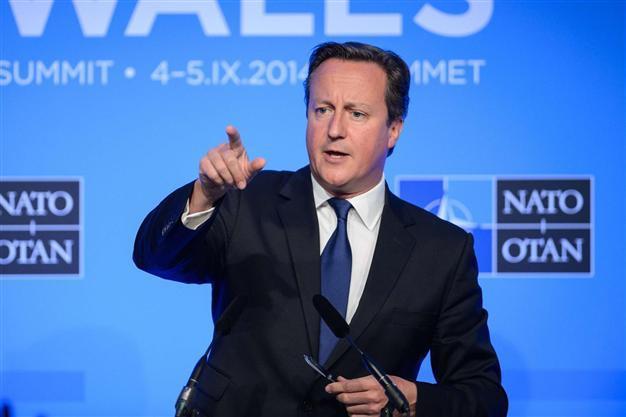British PM heads north as Scotland vote tightens
LONDON - Agence France-Presse

David Cameron and opposition Labour leader Ed Miliband agreed to skip their weekly debate in the House of Commons on Wednesday to head north. AFP Photo
Prime Minister David Cameron on Sept. 9 announced a last-minute trip to Scotland to campaign against independence as supporters of the United Kingdom rallied to counter a surge in separatist support ahead of next week's referendum.Cameron and opposition Labour leader Ed Miliband agreed to skip their weekly debate in the House of Commons on Wednesday to head north after opinion polls indicated there was a real prospect of the 300-year-old union breaking up.
"Tomorrow the right place to be isn't in Westminster at prime minister's questions, it's being in Scotland listening to people, talking to people," said Cameron, the leader of the Conservative party.
With just nine days to go until the referendum on September 18, he said: "In the end it is for the Scottish people to decide but I want them to know that the rest of the United Kingdom, and I speak as prime minister, want them to stay."
Cameron will not share a platform with Miliband but their joint decision to hit the campaign trail, along with Liberal Democrat leader Nick Clegg, the deputy prime minister, reflects a new sense of urgency in the unionist camp.
A YouGov poll at the weekend put the pro-independence "Yes" camp ahead for the first time, sending shockwaves through a campaign that until a month ago looked set to end in a crushing defeat for the separatists.
The leaders of the Scottish Conservative, Labour and Lib Dem parties united earlier Tuesday in Edinburgh to endorse a timetable for the transfer of new powers to the devolved Scottish government in the event of a "No" vote.
Former Labour prime minister Gordon Brown set out the plan in a speech on Monday, pledging that draft legislation giving Scotland more control over tax and welfare spending could be ready as soon as January.
But First Minister Alex Salmond, the leader of the Scottish National Party (SNP), said the "panicky" unionists were merely re-packaging proposals published earlier this year.
"I think today what we've seen is the disintegration of the 'No' campaign -- a back-of-an-envelope non-plan to cobble something together at the last minute because they're losing this election," he told reporters at a rally in Edinburgh.
Salmond added: "We are extremely confident of victory but we're not over-confident and we are going to be working flat out."
The YouGov poll on Sunday put the "Yes" camp ahead by two points, a slim margin but a major development given that the same polling company put them 22 points behind one month earlier.
Another poll on Tuesday by TNS Scotland confirmed the two sides were neck and neck, putting the "Yes" camp on 38 percent and the "No" side on 39 percent.
"This poll reveals a remarkable shift in voting intentions. It's too close to call," said TNS Scotland head Tom Costley.
The polls show Labour voters in particular are shifting towards independence, prompting the deployment of Brown and other senior politicians from the party.
Cameron has been taking a back seat amid fears his unpopularity would harm the campaign and was not expected in Scotland until next week, reports suggest.
His Conservative party has only one Scottish member of parliament out of 59, while the premier is trusted by just 23 percent of Scots, according to a recent YouGov poll.
A similar percentage trust Labour leader Miliband, but Brown fares better, on 32 percent, although he remains well behind Salmond on 42.
But the shifting political landscape has moved Cameron to act, and on Tuesday the Scottish saltire flag was set to be raised above his Downing Street office in a show of support.
The latest polls sent the pound tumbling to a 10-month low against the dollar, amid continued uncertainty about the effect that independence would have on the British economy.
The SNP say Scotland would keep the pound, but the unionist parties in London say this will not be possible -- a view reinforced by the governor of the Bank of England.
"A currency union is incompatible with sovereignty," Mark Carney told a meeting of trade unions in Liverpool, northwest England, on Tuesday.
















